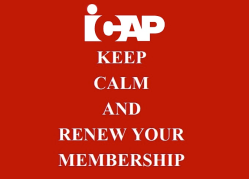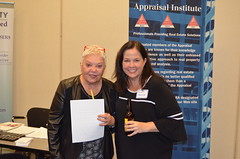Monthly Archives: November 2019
ICAP’s 2019 Career Expo and Networking
ICAP’s 2019 Career Expo and Networking
Join ICAP for an evening of networking.
November 19, 2019
5:00 – 7:00 p.m.
205 West Wacker, #202 Chicago, IL
Featuring special guest speaker Mario Treto, the Acting Director of Real Estate for the Illinois Department of Financial and Professional Regulation
Food, drinks and giveaways will be provided.
Registration is limited!
If you have any questions, please contact
info@icapweb.com
Appraisers/Networkers Register For Free Here
Employers Register Here
Join These companies and more!
ICAP in Washington, D.C.
ICAP in Washington, D.C.
Thursday – October 17, 2019:
ICAP attends The Network of State Appraiser Organizations (NSAO) Meeting
Representatives from approximately 17 State coalitions (including ICAP’s President Karen Emerle, SRA) gathered in Washington, DC on October 17, 2019 at the National Association of Realtors Building. Prior to and in-between guest speakers, introductions and a synopsis covering ongoing coalition work in the different States was presented. One noted comment: Inspections requiring “quality and condition” are not just a statement of fact, but part of the appraisal process calling for judgement by the appraiser. Guests Stephen Cannon and Allison Sheedy, partners in the Constantine-Cannon LLP firm, updated those in attendance on the Louisiana FTC case and the de-minimis threshold increase. Guests David Bunton and Kelly Davids from The Appraisal Foundation centered the discussion around evaluations, USPAP Standards, Industry Advisory Council, public meetings, Departure Rule, FIRREA, Interagency Guidelines, number of licensees, PAREA, de-minimus transaction value, waivers, HR2852, HR3619, and reports from the Government Accountability Office and Treasury. The last guests of the day were Phil Crawford (Voice of Appraisal), Jonathan Miller (Housing Notes), and John Russell (ASA Lobbyist). Topics briefly covered included bifurcation, machines, single-family investment market, bond market, waivers, LTV futures market, AVMs and modernization. Phil Crawford and Lori Noble (WVCAP) previewed and invited all to join findmyappraiser.com (owned and operated by Voice of Appraisal Productions LLC).

Friday – October 18, 2019:
ICAP attends the ASB Public Meeting and House Financial Services CommitteeStaff Representative Meeting
Attendees at the ASB Public Meetinglearned that the 2020-21 Edition of USPAP is ready for purchase, the instructors’ re-certification course is available, and the national USPAP real estate appraisal course is developed.
The public hearing centered on “Evaluations”. Chairman Miller informed the audience that the ASB was still in the information gathering stage and no decision has yet been made. He touched on the construct of FIRREA, real estate property, market value of real property collateral federal financial agencies definitions, public trust, the absence of current standards, the rising de-minimus levels, who can perform evaluations, and complying with USPAP for appraisers who perform evaluations. The ASB received 65 comment letters. Panels for the public hearing on evaluations included lenders/financial institution contractors, state appraiser regulators, and professional appraisal organizations. Representing the lenders/financial institution contractors were Sharon Whitaker (ABA), Katherine A. Owen (BofA), Mark Chapin (REVAA) and Gerald (Jerry) Yurek, (PNC Bank). The state appraiser regulators included Bruce Unangst (LA Real Estate Appraisers Board), Kristen Worman (Texas Appraiser Licensing and Certification Board), Neva Conway (AL Real Estate Appraisers Board), and Gae Lynne Cooper (OR Appraiser Certification and Licensure Board). Jim Murrett (AI), Francois (Frank) K. Gregoire (NAR), John Russell (ASA), and William Riedel (Network of State Coalitions) offered perspective for the professional appraisal organizations. Each panel presentation was followed by a Q & A session. The Evaluation Standards in USPAPconcept paper and written comments received can be found on the Appraisal Foundation website: https://www.appraisalfoundation.org/imis/TAF/Exposure_Drafts.aspx
“NETWORK” State coalition representatives had an opportunity to meet with Pierre C. Whatley. Part of the Honorable Maxine Waters, Chairwoman, of the House Committee on Financial Servicesprofessional staff, Mr. Whatley provided the appraiser coalition representatives amble time to discuss a variety of current issues surrounding the appraisal profession. Some of the topics touched upon were: Modern technology, rural “shortage” issues, the AMC role, FRTs, de-minimus, TRID, waivers.

Saturday – October 19, 2019
ICAP attends the AARO 2019 Fall Conference
Saturday morning activities included three “Round Robbin” topics: New AARO Website, How Evaluations Co-exist in a USPAP World, and TAF Resources for State Regulators.
Seven bids with each provider having a different idea for the New AARO Website.Panelists Brandy March (IA) and Corey Kost (ND) provided a preview comparison between the current and the NEW website. Development goals included the ability to increase effectiveness, utilization, and usability. Selected for ability to expand, provide AARO vetted CE offerings, add/change features, and additional future potential use options. The vision for the new website included such items as event emails, administrative efficiencies, payments, discussion forums/blogs, links to each State’s rules, statutes, program administrators, et cetera.
Panelists Gae Lynne Cooper (OR), Wayne Miller (ASB), and Paul Ping (CBRE) presented How Evaluations Co-exist in a USPAP World. Approximately ten states, including Tennessee, Virginia, and Utah, are considering “evaluation exclusions” to their ordinances. Panelist Cooper stated Oregon allows for unlicensed people to do evaluations. Effective January 1, 2020, ORS 674.100 is amended to allow state licensed or state certified appraisers to perform evaluations if the evaluation includes a disclaimer as specifically stipulated in the amendment: “I am a state licensed appraiser or a state certified appraiser. This evaluation was not prepared in my capacity as a real estate appraiser and might not comply with the uniform standards of professional appraisal practice.”Link: https://olis.leg.state.or.us/liz/2019R1/Measures/Overview/SB109. Panelist Miller said that USPAP wasn’t developed specifically to dictate what or what not a financial institution can do. Within USPAP, it doesn’t really matter what you “call it,” it is an appraisal (ref: USPAP AO 13 2018-2019 Edition). The Interagency Guidelines carve out exemptions and describes the minimum content that should be included in an evaluation. Panelist Ping focused on evaluations from a financial institution perspective. Outlining the various necessary items to be included in the evaluation, (client, intended use, interest being valued, approach to value, H & BU, MV, Exposure Time, Certification), Mr. Ping believes an appraiser can perform an evaluation and comply with USPAP as the Interagency Guidelines say: “must use someone who is knowledgeable on real estate in that market to render that opinion.” Interagency Guidelines are the rules for banks to follow. While each institution is different in deciding who does or does not get an evaluation and/or appraisal, the Guidelines provide instruction that each financial institution has in place risk based programs to manage appraisal and evaluation products, establishing how the institutions obtain these products. Evaluations on what is considered a “low risk” loan today, tomorrow might no longer be considered “low risk.” Final thoughts posed to the audience: “Who should do evaluations? Should appraisers be mandated to follow USPAP?”
TAF Resources for State Regulatorspanelists were David Bunton (TAF) and Kelly Davids (TAF). Their presentation covered AQB Course Approval Programs, Voluntary Disciplinary Action Matrix, AQB Real Estate Degree Review Program, Resources, and State Regulatory Advisory Board. All jurisdictions utilize the same licensing exams. The current pass rate is 65% and it is believed the pass rate should never be above 70%. The Investigator Training Program is one of the most successful programs and is realized through AARO. Three levels of instruction, taught by regulators very familiar with the topics and also are the subject matter experts on the material. 100% of the cost is reimbursed by the ASC. Each state is allowed two participants. If openings exist, more are allowed. There is a “wait list.” The courses are offered throughout the country, so everyone has access. The Voluntary Disciplinary Action Matrix grid (2008-2009) was based on parameters from the Arizona Appraisal Board. There are five levels of disciplinary action, minimum to maximum disciplines. The 2020-2021 Matrix will soon be up on the website. The AQB Real Estate Degree Review Program includes the AQB approved degrees in Real Estate list which can be found on The Appraisal Foundation website (http://appraisalfoundation.org.) Twenty (20) programs have been approved. TAF has a number of resources available: U-tube channel includes AF “Who We Are”, a number of videos (first one in 2010) and webinars, some of the brochures have been made into videos. The resources found on the website may be reproduced and used. Developed from the Level I Investigators course is a four hour Introduction to Terms and Concepts of USPAPcourse. Residential Review and USPAP Compliance. Multiple brochures, fact sheets and other information is available (ASB and USPAP, AQB and Minimum Qualifications, Restricted Appraisal Reports, TAF Fact Sheets.
Mr. Bunton and Ms. Davids are available for speaking engagements, mostly at their expense. See link for additional information:
The Q and A Forum, Standards and Qualifications typically provide a 24 hour response time. If a question has broader implications, it is posted on their website. There are now over 400 Q and A’s posted by tag lines on the website. It can be found under Standards and Qualifications on the home page. The link is: https://www.appraisalfoundation.org/imis/TAF/Standards/Q_As/TAF/QAs.aspx?hkey=29db1bf8-827d-4f7b-b525-06ac9f596637
Corrective education is now available online. While anyone can take these courses (cost $250-$300), they are not IDEC approved and are not approved for CE in any of the jurisdictions. Four courses are currently being updated to 2020-21 USPAP.
Four new courses will be coming out next year (2020): (1) Missing Explanations, (2) Extraordinary Assumptions and Hypothetical Conditions, (3) Competency, and (4) Reconciliation of Comparable Sales.
The AF vision and mission statement(s) is about maintaining Public Trust in Valuation. As such, it was suggested “we should talk with and not at each other”.http://tafapp.advsolhosting.net/imis/TAF/About_Us/TAF_Boards/TAF/TAF_Boards.aspx?hkey=7b71f017-fd58-4c72-bf3c-90fdfb06cd56
USPAP: In April, released the course outline. Mid-summer, the course given to course providers. Online approval to states, and in the next several weeks, it will be online and on the streets. TAF requested a grant, which is awaiting approval, in order to provide each jurisdiction with two copies of the 2020-21 Edition of USPAP.
Afternoon sessions included Job Function Breakouts. Two cycles per job function, some of which were closed to the public.
ICAP attended the Education Providers, Appraiser Associations & Appraiser Related Organizations session, moderated by Deanna Ilk (ASFMRA) and Charlie Gress (OCAP). The main topic of discussion centered on the “Standardization of CE Amongst the States” initiative. The initiative would provide: (1) an easier way to obtain CE approval from other states once credit for a CE course has been approved by one state, (2) a reciprocity site listing which courses are approved in each state, (3) a national portal for licensing, (4) interstate agreements in place between states providing automatic approval in next state, (5) core set-up requirements in each state equal to requirements in other states, and (6) maintaining state fees. Additional discussion topics were: (1) standardization of licensing; national mortgage licensing system, (2) ASC application for grant money in order to do review work, (3) current disciplinary issues would suggest a potential “current topic of interest” that might be developed as a CE course, and (4) potential ways to better the practitioners. Texas already has a model—peer review work. Ohio, “Appraisers Helping Appraisers”.
Sunday – October 20, 2019
ICAP attends the AARO 2019 Fall Conference
Advisory Council Meetings held in the morning included the Professional Organizations Advisory Council, chaired by Karen Emerle (ICAP). The APOAC meeting discussed topics related to the four identified responsibilities of the council. Compliance with education and qualifications requirements included the agreement amongst states for minimum CE approval requirements, interstate formal agreements, the hope all jurisdictions would participate, and suggestions for approving those CE topics/courses mandatory within a specific jurisdiction. Appraiser challenges consistent with regulatory authority the participants felt were still the top two issues are evaluations and waivers. For promoting appraiser professionalism within their jurisdictions, suggestions that might be considered for implementation revolved around how to encourage their licensees to join a related professional organization, provide a peer review/mentoring program with qualified instructors/mentors, and how to qualify one as an instructor/mentor. To do this, it was suggested an AQB Certified USPAP Instructor be used, and/or provide an educational program which would qualify an individual to become an approved instructor/mentor.
The Trainee Progress Monitoring presentation was presented in the afternoon. Panelists were Claire Brooks (ASC), Diana Piechocki, (AR), and Dee Sharp (WA).
Panelist Brooks reiterated the AQB Criteria for trainee supervisors and the difference between some state requirements as to the number of trainees allowed each supervisor. She felt the biggest hurdle is finding competent supervisors. The challenge is to find a proper balance without making the criteria too restrictive and stringent. Suggested a supervisor could have more than three trainees provided the following three things were in place: (1) progress monitoring (2) supervisory certified appraiser qualifications (3) supervision and oversight requirements of supervisory appraisers. Progress and monitoring definitions should be given.
Panelist Sharp spoke about Washington State’s current program. Ms. Sharp felt the biggest challenge is getting into the industry, finding a supervisor. Washington’s rules/laws for a supervisor with more than three trainees is to “not to exceed eight in all progress levels at any one time.” Mentoring plan and an application to the Department which allows the trainee to have the State do a “review (check)” of their report in the first six months. One can be an appraiser and a business owner, but not necessarily a “teacher”.
Panelist Piechocki, the current Director of the Arkansas Appraiser & Licensing Board, has prior experience as an investigator (4 years) and as an appraiser (19 years). The AR Board is a decision making board consisting of ten members (7 practicing appraisers, and one each consumer representative, banker, and senior citizen). In 2014, AR decided they did not want to allow outside education providers to offer the supervisor/trainee class. They use the AQB Criteria plus AR requirements. Director Piechocki meets every trainee, knows them well, as she shepherd’s them through the process, and says the criteria is an “opportunity wrapped up in a requirement.” Director Piechocki stated Arkansas has not as yet adopted this as a requirement: She is suggesting that the first trainee log must be submitted at 500 hours (or 496, et cetera.) The idea is to make sure the trainee is getting started correctly. The next log submission would be at 1500 hours. It would include a recently completed report of their choosing. This submission would check whether or not the trainee was continuing to perform any identified corrections noted from the first log review. If the trainee is not signing the report, they want to know the trainee is being duly noted in the report for experience credit. The final experience log is submitted with the trainee’s application to upgrade. Once all the required items are received, then the trainee must come in for an interview. If the process has not been followed, then the Board can file a complaint against the supervisor. The trainee can’t practice before their credential is issued.
Monday – October 21, 2019
AARO 2019 Fall Conference
The day’s general sessions included four presentations: (1) Modernization of Title XI- Prospects for a Nationwide Appraiser and AMC Licensing System, (2) Different Perspectives on Background Checks: State, Federal & Others, (3) Casual Conversation with the ASC about Reciprocity, and (4)AMCs- Behind the Scene: Functions, Operations & Quality Control.ICAP was not in Washington, D.C. for Monday’s sessions. However, if interested the PowerPoint presentations should eventually become available on the new AARO website: https://aaro.net/













